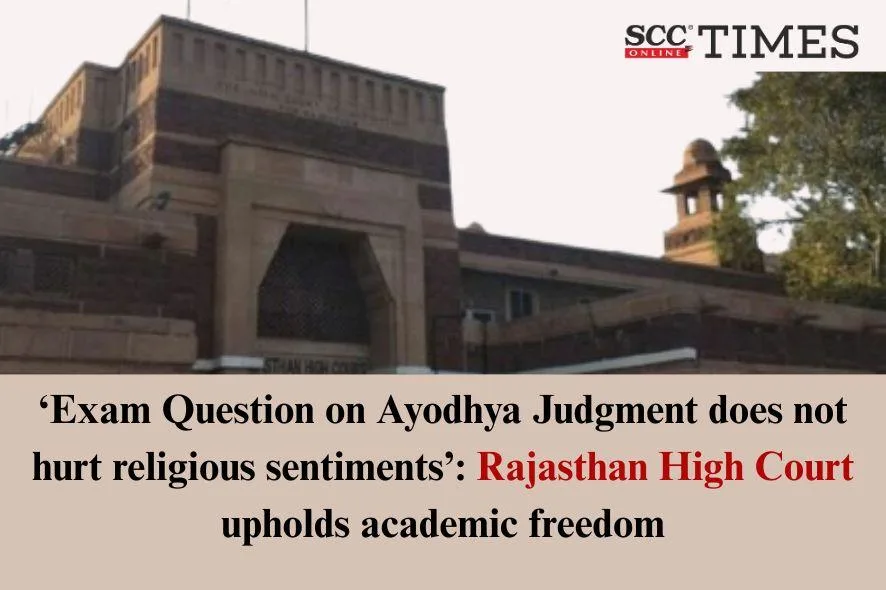Rajasthan High Court: In a civil writ petition filed by the petitioner, seeking directions to investigate and remove biased and inflammatory content from an examination question paper concerning the Ayodhya judgment, a Single-Judge Bench of Anoop Kumar Dhand, J., dismissed the writ petition holding that a challenge to a question paper solely on the ground of hurting religious sentiments under Section 295A of the Penal Code, 1860 (‘IPC’) is not legally sustainable unless deliberate and malicious intent to outrage religious feelings is established. The Court further noted that academic freedom and the autonomy of educational institutions should not be curtailed merely based on subjective language, provided there is no clear breach of law or contemptuous, offensive, or defamatory language.
BACKGROUND
The petitioner, a first-year law student, had appeared in the examination conducted by the respondent university of Legal Languages, Legal Writing, and General English for the LL.B. First Year of the Session 2023-24 on 12-08-2024. The petitioner contended that some passages of the question paper made certain comments on the judgment of Ayodhya Ram Janmabhoomi — Babari Mosque, which were allegedly highly misconceived, biased, and inflammatory, outraging the religious sentiments and violating Section 295A of the IPC and Article 25 of the Constitution of India. Aggrieved by it, the petitioner had filed the present writ petition seeking that the respondents investigate and remove biased, inflammatory, and inappropriate content from academic examinations and materials. He also prayed for strict action against individuals responsible for including the offensive passage and a public apology for the content, which he claimed disrespected the Supreme Court and hurt religious sentiments.
COURT’S OBSERVATION
The Court observed that challenging a portion of a question paper solely on the ground that it hurts religious sentiments under Section 295A of the IPC is not legally sustainable/tenable. It must be established that the content was included with deliberate and malicious intent to outrage religious feelings or to violate specific statutory provisions.
The Court noted that academic freedom and the autonomy of educational institutions should not be curtailed and compromised merely based on subjective language alleged to have hurt sentiments, unless there is a clear breach of law or the language used is contemptuous, offensive, or defamatory. The Court further noted that an academic opinion expressed by a student, teacher, or scholar on a legal judgment, even one involving sensitive issues, cannot be equated with a religious attack. If a citizen writes an essay or critique on a court verdict, reflecting personal interpretation, it must be viewed as a positive and constructive exercise in legal reasoning and critical analysis, provided it does not amount to contempt of the court.
The Court reiterated that the Right to Freedom of Speech and Expression guaranteed under Article 19(1)(a) of the Constitution of India is a cornerstone of democracy, allowing citizens to express views freely. However, this right is not absolute and is subject to reasonable restrictions under Article 19(2). Any critical analysis of a judgment must balance fundamental rights with permissible limitations. Any criticism of a verdict is permissible if founded on reasons, not driven by malice, and not contemptuous, offensive, defamatory, or derogatory. The Court observed that whatever question was asked in the examination paper was merely an expression of the examiner’s view, and in any case, it had not hurt the sentiments of any students except the petitioner. The Court noted that the law must be governed by reasons and not by sentiments.
In light of the afore-stated reasons, the Court dismissed the writ petition.
[Anuj Kumar Kumawat v. State of Rajasthan, 2025 SCC OnLine Raj 3204, decided on 04-07-2025]
Advocates who appeared in this case :
For the Petitioner: Petitioner in-person




